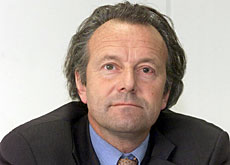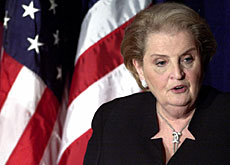Expert says Annan has no reason to resign

A day after publication of a report into the United Nations oil-for-food programme, a Swiss investigator tells swissinfo why Kofi Annan should not lose his job.
But Mark Pieth, who helped to produce the report, believes the UN secretary-general failed to deal properly with a potential conflict of interest involving his son, Kojo.
An independent inquiry has found that Kofi Annan did not influence contract decisions regarding a Swiss firm, Cotecna Inspection, which employed his son.
The report, the second into the UN-administered oil-for-food programme, focused on Annan and his son, Kojo, who worked for Cotecna.
Cotecna received a $10-million-a-year UN contract in late 1998 to certify goods coming into Iraq under the $67 billion (SFr80 million) programme, which began in late 1996 and ended in 2003.
The oil-for-food programme was administered by the UN secretariat and supervised by the 15-nation Security Council.
The report concluded that Cotecna tried to hide its relationship with the younger Annan after the UN contract was signed. It said Kojo Annan had also misled his father.
In response, the UN secretary-general said he had been cleared of any wrongdoing and had no intention of resigning. But he acknowledged that his son had been less than truthful.
swissinfo: What are the main findings in this second report on the UN’s oil-for-food programme?
Mark Pieth: First of all we looked at the role of the secretary-general, Kofi Annan, in the awarding of the contract to Cotecna and we found that there was no evidence that he influenced [the decision]. Furthermore we came to the conclusion that there was not enough evidence to assume that he actually knew that Cotecna was bidding at the time.
But we did conclude that once he knew about a possible conflict of interest and also when he heard that Cotecna was involved in a criminal investigation in Geneva at the time… he did not take appropriate action.
There was an inquiry of about roughly a day and Annan very quickly, maybe understandably as the father of his son, decided there was nothing to look into. But we are saying that he is not just a father, he is also the head of this organisation and he should have been more prudent and taken adequate action. He was not dishonest but this was a bad management decision.
swissinfo: How damaging is this for him?
M.P.: It is not for us to decide what conclusions he should make; on the other hand I don’t think it should cost him his job.
swissinfo: What about the role of Cotecna Inspection, which employed Kojo Annan before and after it won a lucrative contract?
M.P.: They actually got the job on merit – they were the lowest bidder. But we also examined the question whether they in some way influenced the procedure. We have no evidence that they did, but it could still be that they intended to do, and here there’s a strange series of cover-ups.
Cotecna has been quite forthcoming in giving us documents, but they have been lying to us outright. Repeatedly, right up to the beginning of our investigation, they maintained that Kojo Annan, the son of the secretary-general, was not working for them beyond the end of 1998.
Another point is they paid an awful lot of money to [Kojo Annan], which they are not ready to admit to. We know from Kojo Annan that he got close to $500,000, and the company is denying that. They are coming up with new calculations every week and frankly that doesn’t bode well.
swissinfo: How do you interpret that?
M.P.: I’m puzzled – I can’t say more at the moment. That’s why we are continuing to look into it.
swissinfo: What repercussions might there be for the firm, which has denied any wrongdoing, and Kojo Annan?
M.P.: One doesn’t really have to cooperate with us, and if someone lies to us that’s not a criminal offence. But it won’t help their reputation and if it should be found they actually tried to influence [the bidding process] that obviously would be fraud. Now there’s no evidence of that so far but we shall continue to investigate.
swissinfo: What lessons should the UN secretary-general draw from your investigation?
M.P.: This affair has been very much a question of how he was unable to disown his son or why he was not more critical towards his son. There’s obviously an angle of whether he is a good manager. But I think the two elements overlap.
swissinfo: What have your investigations been in Switzerland – apart from Cotecna?
M.P.: We have been looking into a substantial amount of bank records in Switzerland and we are still working on them. They are part of an investigation which will contribute to the final report in the summer. They are focusing in particular on companies on the oil side and the humanitarian side.
swissinfo-interview: Robert Brookes
Swiss professor of criminal law Mark Pieth has been helping to investigate allegations of corruption in connection with the UN’s oil-for-food programme.
Pieth is working closely with the two other members of the investigating panel: the former chairman of the US Federal Reserve, Paul Volcker, and Richard Goldstone, the retired prosecutor of the International Criminal Tribunal for the former Yugoslavia.

In compliance with the JTI standards
More: SWI swissinfo.ch certified by the Journalism Trust Initiative











You can find an overview of ongoing debates with our journalists here . Please join us!
If you want to start a conversation about a topic raised in this article or want to report factual errors, email us at english@swissinfo.ch.